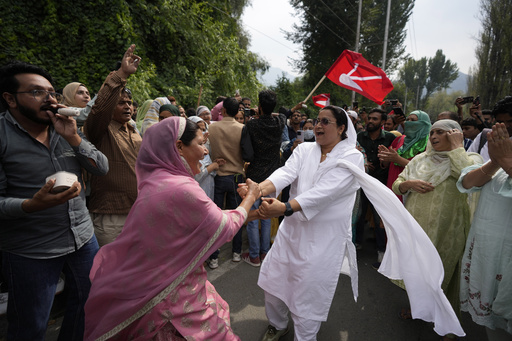
**SRINAGAR, India** — On Wednesday, leaders of the National Conference party, Kashmir’s largest political entity, took their oaths of office to operate a government that holds limited power, marking the first election since India revoked the region’s special status five years ago.
Omar Abdullah, the leader of the National Conference, has been appointed as the chief minister of the region following his party’s success in securing the most seats during the three-phase election process. Although the National Conference garnered support from India’s primary opposition party, the Congress, Congress chose not to participate in the newly formed government.
This vote was significant as it was the first held in Kashmir in ten years and was conducted following Prime Minister Narendra Modi’s Hindu nationalist government annulled the region’s longstanding semi-autonomous status in 2019. The National Conference has been a strong opponent of this move, and its electoral victory is interpreted as a public critique of the changes implemented by the Modi administration.
During a tightly secured ceremony held at a lakeside location in Srinagar, the oath of office for Abdullah and his five council ministers was administered by Kashmir’s Lieutenant Governor Manoj Sinha, who represents the central government’s authority in the region. The event was attended by prominent opposition figures, including Rahul Gandhi of the Congress party.
Despite the newly established government, there will be minimal devolution of authority from New Delhi, as Kashmir will continue to function as a “union territory” under direct central control, with parliamentary legislation dictating its governance. For the local government to gain powers akin to other Indian states, the restoration of statehood for Kashmir would be necessary, but the special autonomy previously granted before the 2019 changes is no longer applicable.
The Kashmir region remains a contested area, divided between India and Pakistan, with both nations claiming full sovereignty over it. Since gaining independence from British colonial rule in 1947, the two nuclear-armed countries have engaged in conflicts over this territory, with two of their three wars centered in the region.
The last time Kashmir held an assembly election was in 2014; at that time, a coalition government was formed between Modi’s Bharatiya Janata Party (BJP) and the local Peoples Democratic Party. However, the alliance fell apart in 2018 after the BJP withdrew, leading New Delhi to take over direct control of the region.
Subsequently, in a significant move the following year, the federal government reclassified the former state, creating two centrally controlled union territories: Ladakh and Jammu-Kashmir. This transition was largely supported in India among Modi’s backers, but it was viewed in Kashmir as an infringement on its identity and autonomy, raising apprehensions about potential demographic shifts in the area.
Since then, the atmosphere in Kashmir has been tense, with restrictions on civil liberties and media freedoms. In the recent elections, the National Conference secured 42 seats primarily from the Kashmir Valley, which is the epicenter of anti-India sentiments, while the BJP won 29 seats exclusively in the Hindu-majority Jammu region. The Congress party managed to gain six seats.
For several decades, there has been a movement among militants in Indian-administered Kashmir, who have consistently opposed New Delhi’s governance since 1989. A substantial number of Muslim Kashmiris align with the rebels’ aims to unify the region, either under Pakistan or as an independent nation.
India maintains that the insurgency is fueled by terrorism sponsored by Pakistan, a claim that Pakistan refutes. Many in Kashmir believe that their struggle is a legitimate fight for freedom. Tragically, this protracted conflict has resulted in the deaths of tens of thousands of civilians, rebels, and military personnel.
